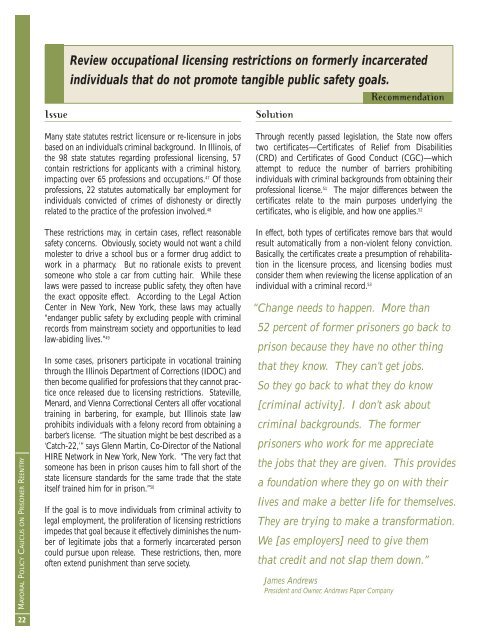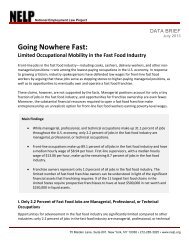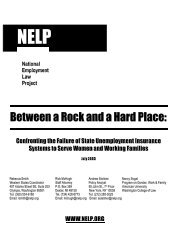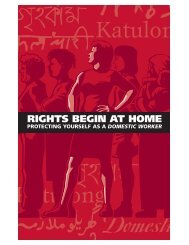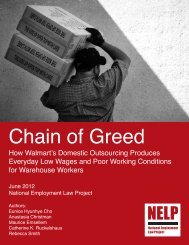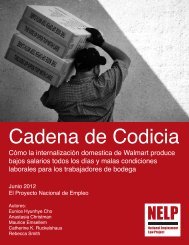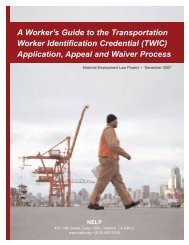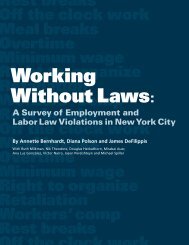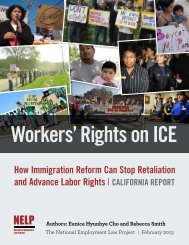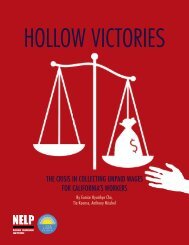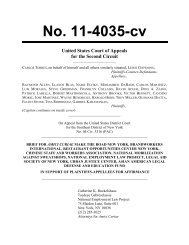Rebuilding Lives. Strengthening Communities.
Rebuilding Lives. Strengthening Communities.
Rebuilding Lives. Strengthening Communities.
You also want an ePaper? Increase the reach of your titles
YUMPU automatically turns print PDFs into web optimized ePapers that Google loves.
Review occupational licensing restrictions on formerly incarcerated<br />
individuals that do not promote tangible public safety goals.<br />
Recommendation<br />
Issue<br />
Solution<br />
MAYORAL POLICY CAUCUS ON PRISONER REENTRY<br />
22<br />
Many state statutes restrict licensure or re-licensure in jobs<br />
based on an individual’s criminal background. In Illinois, of<br />
the 98 state statutes regarding professional licensing, 57<br />
contain restrictions for applicants with a criminal history,<br />
impacting over 65 professions and occupations. 47 Of those<br />
professions, 22 statutes automatically bar employment for<br />
individuals convicted of crimes of dishonesty or directly<br />
related to the practice of the profession involved. 48<br />
These restrictions may, in certain cases, reflect reasonable<br />
safety concerns. Obviously, society would not want a child<br />
molester to drive a school bus or a former drug addict to<br />
work in a pharmacy. But no rationale exists to prevent<br />
someone who stole a car from cutting hair. While these<br />
laws were passed to increase public safety, they often have<br />
the exact opposite effect. According to the Legal Action<br />
Center in New York, New York, these laws may actually<br />
“endanger public safety by excluding people with criminal<br />
records from mainstream society and opportunities to lead<br />
law-abiding lives.” 49<br />
In some cases, prisoners participate in vocational training<br />
through the Illinois Department of Corrections (IDOC) and<br />
then become qualified for professions that they cannot practice<br />
once released due to licensing restrictions. Stateville,<br />
Menard, and Vienna Correctional Centers all offer vocational<br />
training in barbering, for example, but Illinois state law<br />
prohibits individuals with a felony record from obtaining a<br />
barber’s license. “The situation might be best described as a<br />
‘Catch-22,’” says Glenn Martin, Co-Director of the National<br />
HIRE Network in New York, New York. “The very fact that<br />
someone has been in prison causes him to fall short of the<br />
state licensure standards for the same trade that the state<br />
itself trained him for in prison.” 50<br />
If the goal is to move individuals from criminal activity to<br />
legal employment, the proliferation of licensing restrictions<br />
impedes that goal because it effectively diminishes the number<br />
of legitimate jobs that a formerly incarcerated person<br />
could pursue upon release. These restrictions, then, more<br />
often extend punishment than serve society.<br />
Through recently passed legislation, the State now offers<br />
two certificates—Certificates of Relief from Disabilities<br />
(CRD) and Certificates of Good Conduct (CGC)—which<br />
attempt to reduce the number of barriers prohibiting<br />
individuals with criminal backgrounds from obtaining their<br />
professional license. 51 The major differences between the<br />
certificates relate to the main purposes underlying the<br />
certificates, who is eligible, and how one applies. 52<br />
In effect, both types of certificates remove bars that would<br />
result automatically from a non-violent felony conviction.<br />
Basically, the certificates create a presumption of rehabilitation<br />
in the licensure process, and licensing bodies must<br />
consider them when reviewing the license application of an<br />
individual with a criminal record. 53<br />
“Change needs to happen. More than<br />
52 percent of former prisoners go back to<br />
prison because they have no other thing<br />
that they know. They can’t get jobs.<br />
So they go back to what they do know<br />
[criminal activity]. I don’t ask about<br />
criminal backgrounds. The former<br />
prisoners who work for me appreciate<br />
the jobs that they are given. This provides<br />
a foundation where they go on with their<br />
lives and make a better life for themselves.<br />
They are trying to make a transformation.<br />
We [as employers] need to give them<br />
that credit and not slap them down.”<br />
James Andrews<br />
President and Owner, Andrews Paper Company


